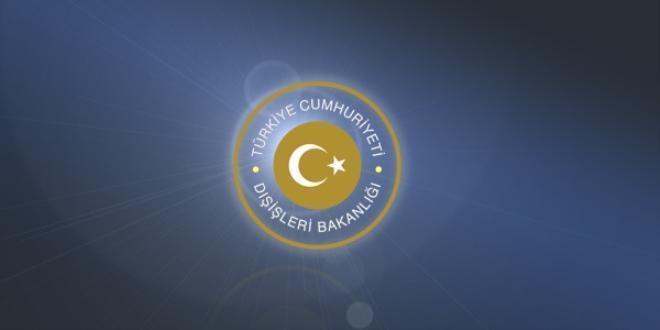
Turkey has said an agreement signed between Greece, Greek Cyprus and Israel on the construction of a natural gas pipeline project from eastern Mediterranean to Europe is a futile effort and repeated its calls on the said countries to cooperate with both Turkey and the Turkish Cypriot state.
“The signature of the agreement on the EastMed natural gas pipeline project is the latest instance of futile steps, aiming to exclude Turkey and Turkish Cyprus in the region.
Any project disregarding Turkey, which has the longest coastline in eastern Mediterranean and the Turkish Cypriots, who have equal rights over the natural resources of the island of Cyprus, cannot succeed,” read a statement issued by Hami Aksoy, the spokesperson of the Foreign Ministry, late Jan. 2.
“We bring this fact once more to the attention of the international community,” he said, reiterating that Turkey is the most commercially feasible and secure route for the utilization of the natural resources in the Eastern Mediterranean and their transfer to the consumer markets in Europe.
“Refusing to cooperate both with us and Turkish Cypriots in spite of this fact, is actually a direct manifestation of some countries’ pursuit of futile political motivations instead of cooperation. We remind the proprietors of the project that such sordid plans will continue to fail in the future, as they did in the past,” he said.
Turkey’s reaction came right after Greek Prime Minister Kyriakos Mitsotakis, Israeli Prime Minister Benjamin Netanyahu and Greek Cypriot President Nikos Anastasiades signed the EastMed pipeline deal at a ceremony in Athens with the participation of their energy ministers on Jan. 2.
The EastMed project is a 1,900-kilometer (1,180-mile) undersea pipeline designed to deliver Israeli natural gas to Europe by 2025.
Although its leaders have not attended the ceremony and the signing of the agreement, Italy is set to be the largest single purchaser of the Israeli gas, but several other southern European countries stand to benefit from the project as well.
Turkey and the Turkish Cypriots have long objected to being excluded from the hydrocarbon activities by Greece, Greek Cyprus, Israel and Egypt in the eastern Mediterranean on the grounds that their sovereign rights were disregarded.
Prior to the signing of the agreement, Turkish Cypriot President Mustafa Akıncı condemned the project, stressing that it “contradicts geographical facts” and was “decided on purely political concerns.”
EastMed pipeline project will not help solve Cyprus’ problem, Turkish Cypriot leader says

Turkey is a guarantor nation for the Turkish Cyprus and has consistently contested the Greek Cypriot administration's unilateral drilling in the Eastern Mediterranean, asserting that the Turkish Cyprus also has rights to the resources in the area.
The pipeline may not pass without Turkey’s consent
Another important aspect of the EastMed pipeline project is the fact that it will have to pass from an area where Turkey has declared as its territorial waters and economic exclusive zone as a result of a memorandum of understanding with Libya on the delimitation of the maritime jurisdiction zone.
At a conference organized by Ankara Social Sciences University and Turkey’s Research Center for Energy Strategies and Policies and Zafer Ateş - deputy director of the energy department at the Foreign Ministry - underlined the fact that those who plan to construct such a pipeline have to receive Turkey’s consent as it will have to pass through Turkey’s maritime jurisdiction areas.